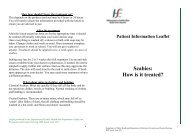national guidelines on the management of outbreaks of norovirus ...
national guidelines on the management of outbreaks of norovirus ...
national guidelines on the management of outbreaks of norovirus ...
You also want an ePaper? Increase the reach of your titles
YUMPU automatically turns print PDFs into web optimized ePapers that Google loves.
Nati<strong>on</strong>al Guidelines <strong>on</strong> <strong>the</strong> Management <strong>of</strong> Outbreaks <strong>of</strong> Norovirus Infecti<strong>on</strong> in Healthcare Settings NDSC<br />
EXECUTIVE SUMMARY<br />
Infecti<strong>on</strong> due to <strong>norovirus</strong> is extremely comm<strong>on</strong> in <strong>the</strong> community with as many as <strong>on</strong>e in <strong>on</strong>e hundred<br />
people becoming ill each year. Noroviruses are highly infectious agents, capable <strong>of</strong> being spread directly<br />
from pers<strong>on</strong>-to-pers<strong>on</strong>, by food and water and through <strong>the</strong> air. The virus is very resilient and can survive for<br />
l<strong>on</strong>g periods in <strong>the</strong> envir<strong>on</strong>ment and <strong>on</strong> surfaces such as door handles or worktops. Because <strong>of</strong> <strong>the</strong>se<br />
features, <strong>norovirus</strong>es can cause widespread and intractable <strong>outbreaks</strong> especially where people are ga<strong>the</strong>red<br />
closely toge<strong>the</strong>r. Since it is a community infecti<strong>on</strong>, <strong>outbreaks</strong> in c<strong>on</strong>gregate settings such as hospitals are<br />
simply a reflecti<strong>on</strong> and a gauge <strong>of</strong> what is happening in <strong>the</strong> community.<br />
Hospitals and residential instituti<strong>on</strong>s are comm<strong>on</strong> locati<strong>on</strong>s for <strong>outbreaks</strong> <strong>of</strong> infecti<strong>on</strong> by <strong>norovirus</strong>es and can<br />
cause extensive disrupti<strong>on</strong> to a very vulnerable group <strong>of</strong> individuals. The number <strong>of</strong> <strong>outbreaks</strong> and <strong>the</strong>ir<br />
extent within <strong>the</strong> acute and residential healthcare sectors can place a c<strong>on</strong>siderable burden <strong>on</strong> <strong>the</strong> health<br />
system. Despite this, <strong>the</strong> illness caused by <strong>the</strong> virus is relatively mild, with more severe cases appearing <strong>on</strong>ly<br />
occasi<strong>on</strong>ally.<br />
Outbreaks due to <strong>norovirus</strong> are not eradicable, but <strong>the</strong>y are c<strong>on</strong>trollable. There is a growing body <strong>of</strong><br />
inter<str<strong>on</strong>g>nati<strong>on</strong>al</str<strong>on</strong>g> evidence that indicates interventi<strong>on</strong>s that will minimise <strong>the</strong> effects <strong>of</strong> <strong>the</strong> virus. Within hospitals<br />
and o<strong>the</strong>r healthcare settings, an early, rapid resp<strong>on</strong>se to an outbreak due to <strong>norovirus</strong> is <strong>the</strong> key to its<br />
c<strong>on</strong>trol. Having an agreed hospital/residential home outbreak plan in place is <strong>the</strong> best method for ensuring<br />
uniformity and effectiveness <strong>of</strong> resp<strong>on</strong>se.<br />
Prompt establishment <strong>of</strong> an outbreak c<strong>on</strong>trol team that is resp<strong>on</strong>sible for c<strong>on</strong>trolling <strong>the</strong> spread <strong>of</strong> infecti<strong>on</strong><br />
and coordinating <strong>the</strong> investigati<strong>on</strong> <strong>of</strong> and resp<strong>on</strong>ses to an outbreak is essential. Early communicati<strong>on</strong> and<br />
<strong>the</strong> rapid instituti<strong>on</strong> <strong>of</strong> early c<strong>on</strong>trol measures will aid this.<br />
The essential early steps in c<strong>on</strong>trol <strong>of</strong> an outbreak will include immediate cleaning and envir<strong>on</strong>mental<br />
dec<strong>on</strong>taminati<strong>on</strong> <strong>of</strong> soiled areas, frequent hand washing with warm water and soap for all staff and patients,<br />
segregati<strong>on</strong> <strong>of</strong> those who are ill from those who are not (cohorting), limitati<strong>on</strong> <strong>of</strong> movement <strong>of</strong> staff and<br />
patients, exclusi<strong>on</strong> <strong>of</strong> ill staff from work for 48 hours after <strong>the</strong>ir last episode <strong>of</strong> vomiting and/or diarrhoea and<br />
sensible <strong>management</strong> <strong>of</strong> hospital visiting.<br />
Increased hospital attendance is a factor in <strong>the</strong> development and sustaining <strong>of</strong> <strong>outbreaks</strong> <strong>of</strong> illness due to<br />
<strong>norovirus</strong>. The effects <strong>of</strong> noroviral infecti<strong>on</strong>, however, can be minimised by reducti<strong>on</strong> <strong>of</strong> <strong>the</strong> susceptible pool<br />
<strong>of</strong> patients (particularly elderly patients) by <strong>the</strong>ir discharge or transfer to step-down facilities. This will also<br />
provide increased capacity within hospitals to allow more effective cohorting <strong>of</strong> patients.<br />
Given its ability to be shed by c<strong>on</strong>valescing cases for a minimum <strong>of</strong> 48 hours after symptoms subside,<br />
effective c<strong>on</strong>trol will involve ensuring that affected staff leave <strong>the</strong> ward and go <strong>of</strong>f duty immediately <strong>the</strong>y<br />
develop gastrointestinal symptoms and remain <strong>of</strong>f work for a minimum <strong>of</strong> 48 hours after <strong>the</strong>ir last episode <strong>of</strong><br />
vomiting or diarrhoea. There must be <strong>the</strong> provisi<strong>on</strong> by agencies to ensure that ill staff can remain <strong>of</strong>f duty for<br />
<strong>the</strong> necessary time period, o<strong>the</strong>rwise infecti<strong>on</strong> will be reintroduced.<br />
Hospital cleaning is essential in preventing and c<strong>on</strong>trolling <strong>of</strong> <strong>outbreaks</strong> <strong>of</strong> illness due to <strong>norovirus</strong>. There<br />
should be provisi<strong>on</strong> by agencies to ensure that regular cleaning schedules and protocols agreed with<br />
infecti<strong>on</strong> c<strong>on</strong>trol pr<strong>of</strong>essi<strong>on</strong>als should be guaranteed and safeguarded. And during <strong>outbreaks</strong> <strong>the</strong>se should<br />
be enhanced to meet <strong>the</strong> increased need for cleansing.<br />
This guidance is intended for use and adaptati<strong>on</strong> in all healthcare settings. Local arrangements can be put in<br />
place to match local needs, but <strong>the</strong> above principles should guide decisi<strong>on</strong> making in all circumstances.<br />
- v -






